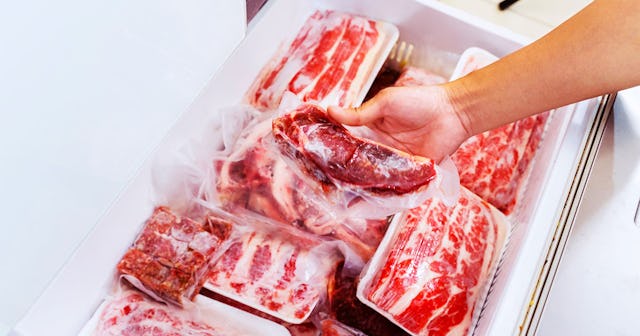How Long Is It Safe To Store Meat In Your Freezer?

Growing up, I can count on one hand how many times a year I remember my Mom buying fresh meat. (Thanksgiving, Christmas, and New Year, if you were wondering). For a family of six with one parent working full-time, buying in bulk and buying frozen was a great way to keep costs low. So when I ventured out on my own, I literally knew nothing about the rules that came with freezing meat. Except for my mother’s favorite story about the one time she ate chicken that had been thawed, refrozen, and then cooked. Subsequently, she had awful food poisoning.
After doing some research, her experience likely had a lot to do with the quality and safety of the chicken she was eating. These are the two most important things to consider when it comes to storing your meat long-term. When you’re buying your meat fresh and then freezing it, there are two main criteria you want to keep in mind.
First, how long can you freeze it without giving your family food poisoning? Unintentionally, of course. Second, how long can you freeze your meat and still have it be as tasty as it’s meant to be? When you get a good deal, and buy in bulk, you want to make sure it doesn’t go to waste. So let’s talk about the difference between safety, quality, and best practices when it comes to freezing meat.
Safety First: How Long Can You Freeze Your Meat?
When prices are right, I am one to stock up (within reason). Which means the freezer is full of chicken breast, ground turkey, and fish that tastes like chicken (because, children.) I don’t know if it’s because I was raised on that giant bag of frozen chicken breasts, but when I’m able, I buy fresh. But seeing as that raw meat only lasts a couple days in the fridge, freezing it is something I rely on often.
But of course, nothing lasts forever. Except for frozen meat, that is. The good news, according to FoodSafety.gov, is that frozen foods stored continuously at 0 °F or below can be kept indefinitely. That seems like a really, really long time to me, but in terms of safety, it’s totally legit. Now, of course, this doesn’t mean pulling that turkey out to thaw from 1992 is going to be real tasty, but it certainly won’t kill anyone.
The difference between keeping meat in your freezer for eternity and keeping it for a few months comes down to the quality. If the meat isn’t stored properly in the freezer, the worse its quality will get, because freezer burn and such. So, you have two choices. You can either freeze your meat long term, in hopes of making it through the next apocalypse. Or, at least save it for a day, preferably before then, where it will still be tasty and of decent quality.
Vinicius Bacarin/Shutterstock
Not All Meats Are Created Equal
So, now that we know if you find yourself in a Hunger Games-style situation, all that meat in your freezer will be safe to eat, let’s talk about when it will taste best. A variety of different meats can be frozen, but whole pieces, as opposed to anything ground, freezer better, for longer. As a rule of thumb, ground meat is usually best within three to four months of packing it away — compared to whole pieces of meat, which run more along the lines of four months to a year. Depending on whether you store chicken, ham, fish, etc, there are also a variety of time frames within each type of meat to follow. Take a look at this handy guide from the FDA which breaks down different freeze times based on what type of meat you’re freezing.
There is one final thing to consider when making space in the freezer to stockpile. Is the meat you’re freezing raw or already cooked? One of my favorite things to do when the weather starts to get brisk is to make big batches of soups or chili that I can freeze and then toss in the crockpot. If you’re a fan of this no-fuss style of cooking, make sure if you are adding any type of meat to your recipe to remember it will be at its best two to four months after you make it.
Best Practices
When it comes to buying, preparing, or storing meat, luckily, it isn’t terribly difficult. As a good rule of thumb, if it doesn’t pass the smell test — trash it. And I’m talking wet dog, an oddly sweet smell, or just plain death. Trust your nose! You can avoid running into this predicament by always keeping raw meat (and leftovers) refrigerated or frozen.
Another best practice is to always label whatever you’re storing away. Keeping track of the date and type of meat will make sure you minimize your waste and maximize quality. And be sure to keep those suckers wrapped up tight. You don’t have to make the investment into a vacuum-sealing machine, just double wrap your product in a ziplock freezer bag, plastic wrap, or even the grocery bag it came in.
Keeping your meat fresh, safe, and tasty in the freezer isn’t rocket science, so buy in bulk with confidence. And truly, if I’ve managed to store, prep, and cook meat without killing anyone, I promise it will be a breeze for you.
This article was originally published on